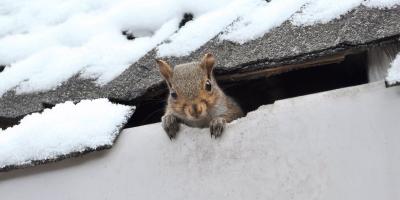What Happens to Wasps in the Winter?

It may feel far off now, but before we know it we will be back to the sweltering days of summer. Once again, the temperature will be high, our air conditioners will be cranking, and many of our insect foes will be out in full force again; for instance: wasps.
It’s easy to spot the pattern that as the temperature rises, so do the wasp populations. Wasps are veritable sun worshippers and thrive in hot, dry weather, which is why we see them -- or their nests -- so often during the summer months.
With fall’s arrival, the wasps abandon their nests, leaving behind nothing but a shell of what was a colony’s home, which begs the question: how can wasps possibly survive brutal New England winters?
Teamwork: Central to a Colony’s Success
Wasps are team players, always working together to ensure the success of their colony and, more specifically, the survival of its queen. Each individual wasp has a unique job, a contribution which helps develop and keep pace for the effective construction of the nest.
Worker wasps manage various details like nest building, watching over the queen’s eggs and larvae, finding food and protecting the nest and those inside from predators. Male wasps have the job of reproducing with the queen in order to ensure the creation of a new colony the following year.
Long Live the Queen
During the colder months, as colonies of wasps die out, some female wasps will find warm shelter to overwinter. These are future queens of new colonies that will form once the weather warms. Before a “princess” wasp can produce a colony, however, her first vital job as a future queen is to survive, which means finding a safe spot to overwinter.
She may hide under logs, in chimneys, under decks, and possibly even inside your house. Once secure in their overwintering spot, these wasps enter a state of diapause which suspends their development, conserving precious energy, in order to survive the cold months. As soon as spring returns and these young females can emerge, they have the opportunity to become queens of new wasps colonies.
Wintertime Wasp Sightings
If you spot a wasp in your house during the snowy season, you’re likely looking at an overwintering wasp queen who has found her way inside, likely through a small spot near your home’s roofline.
Rest assured, a wasp in your home during the wintertime will not be much of a threat or even a nuisance; in all likelihood, you may not even know she is there as wasps are not aggressive in the winter months. In the spring she will plan an escape route--she does not want to be inside just as much as you do not want her to be. Springtime sends her on a mission to lay her eggs and start a new colony as soon as possible.
Even though this shelter-seeking queen doesn’t pose a threat to your household, her offspring certainly could come summertime. That’s why we recommend treating your home early, before wasps have the opportunity to build a nest and start a new colony on your property.
Speak to a representative today about what you can do to protect your home and family against wasps this year.



